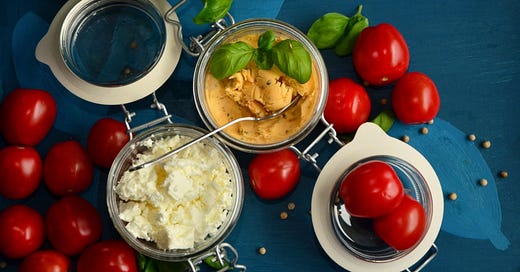In response to my article on phytates and bone health, I've had a couple of requests to write about the other big scary 'antinutrient' that oNLinE nUtRItIoN gURus love to hyperventilate about: lectins.
TheLastBattleStation asked me, "Is there really a concern over anti-nutrients, e.g., lectins?"
And Tali sent me the following message with a link to a video by used car salesman former cardiothoracic surgeon Dr Steven Gundry:
"I came across this ad (below) which made me cringe, and thought of you.
He tries to promote the health benefits of (shock!) drinking olive oil, (to lose weight 🤷♀️) and then goes on to state that the reason the Mediterranean diet is 'so healthful' is not the food they are eating but what the food is covered in, as the OO supposedly helps with combating the 'ill-effects' of all the lectins they are eating🤦♀️ (or something like that). I'm so sad that this sort of information is being circulated and some people will actually believe it...
Perhaps you can address some of this type of misinformation in a future article?Promoting 'gundryoliveoil.com' I believe.
Kind regards,
Tali"
Why yes, Tali, as a matter of fact I would love to address this type of misinformation. Although I've come to detest that word, owing to its weaponisation by the blob and its Sturmabteilung, the calamity of caterwauling Karens (and whatever one calls the male of the species), known as 'mis- and disinformation experts'. So let's just call it what it is: bollocks.
I'm tempted to end it right there, and send you off to enjoy a lectin-rich meal in peace, but of course, what you've come to expect from me is an in-depth exploration of topics related to nutrition and health. So go and grab yourself a cup of something bracing, and let's settle in for a deep dive on lectins.
What the heck are lectins, anyway?
Lectins are one of many deadly poisons that plants deviously concoct in their ceaseless quest to kill you. And the guy saying this has a hot girlfriend, so it must be true.
No, silly. Lectins are small, carbohydrate-binding proteins produced by both animals and plants; in fact, they are"ubiquitous in living organisms" - including humans. So, I guess cannibalism is probably a bad idea if you're afraid of eating lectins.
The principal role that lectins play in the organisms that produce them - remember, that's every living thing on earth - is to facilitate cells' ability to recognise and respond to particular molecules. For example, certain lectins help animals' immune systems to recognise carbohydrates that are found exclusively on pathogens. Others modulate metabolism, hormone secretion and the composition of the gut microbiome.
So what's all the fuss about?
Pretty much nobody except scientists who study plant biology and immunology - oh, and those who develop biochemical warfare agents; more on that shortly - had even heard of lectins until Steven R. Gundry MD published The Plant Paradox in 2017.
In The Plant Paradox - which bears the clickbait-tailored subtitle "The Hidden Dangers in 'Healthy' Foods That Cause Disease and Weight Gain" - Gundry claims that a diet high in lectins from certain plant foods including grains, legumes, fruit, and nightshade and cucumber-family vegetables, along with some dairy products, is the cause of virtually every chronic condition that plagues the modern world.
According to Gundry, obesity, allergies, arthritis, asthma, autoimmune diseases, cancer, cardiovascular disease, dementia, depression, diabetes, headaches, and Parkinson’s disease are all caused by excessive consumption of these lectin-containing foods. Gundry claims that lectins cause these conditions by damaging the gut lining, allowing intestinal bacteria, undigested food and waste products to 'leak' through the gut wall into the bloodstream. And he repeatedly claims that these bold assertions are backed up by copious scientific evidence which, oddly enough, he fails to cite. That would be because there isn't any evidence whatsoever that consumption of lectin-rich plant foods increases the risk of any of these conditions. As the meticulous deconstruction of The Plant Paradox conducted by Red Pen Reviews concludes,
"The book’s strong claims that the plant paradox program can prevent and reverse obesity and most chronic diseases are poorly supported by scientific evidence. We were unable to identify even modest evidence that lectins may be a root cause of obesity or any of the chronic diseases mentioned in the book."
Testifying to the insatiable appetite of human beings all over the world for complete bulldust - as long as it's sufficiently differentiated from the bulldust they previously consumed - over two million copies of this book were sold in its first five years in print, and it was translated into 26 languages. Gundry leveraged the success of The Plant Paradox into multiple spin-off books and a range of nutritional supplements. The latter includes Lectin Shield®, "a unique blend of potent compounds designed to help your body eliminate these potentially harmful proteins", which will set you back just US$80 for a month's supply - or subscribe and save to get a random collection of ingredients backed by precisely zero published evidence, regularly shipped to your door, to protect you from the dangerous consequences of eating foods like tomatoes, cucumbers and lentils. As P.T. Barnum is reputed to have said (although his contemporaries insisted that he didn't), "There's a sucker born every minute."
Contrary to Gundry's fact-free assertions, both epidemiological and clinical evidence clearly shows that high consumption of lectin-rich foods such as legumes, whole grains, and vegetables and fruits, is associated with lower risk and/or remission of pretty much every condition that he blames on lectins.
Furthermore, particular plant lectins show promise in disease treatment. For example:
Several plant lectins "have been found to possess anticancer properties in vitro, in vivo, and in human case studies; they are used as therapeutic agents, preferentially binding to cancer cell membranes or their receptors, causing cytotoxicity, apoptosis, and inhibition of tumor growth." Mistletoe lectin has been used in European integrative cancer clinics for decades, and there is now a substantial body of evidence demonstrating its benefits. Boiled red kidney bean lectin exhibits anti-inflammatory and anticancer properties and has been proposed as an anticancer agent. Broad/fava bean lectin caused colon cancer cells to redifferentiate, meaning they turned back into normal-looking and -functioning colon tissue. A lectin isolated from Chinese black beans induced mitochondrial dysfunction and apoptosis in colorectal cancer cells, inhibiting their growth.
Some plant lectins show considerable promise as antibacterial and antifungal agents, with the potential to fill the void created by antimicrobial resistance. Legume lectins demonstrate antifungal activity against Candida albicans. And unlike existing antimicrobial drugs, plant lectins don't just target infectious organisms; they bolster host resistance to infection by modulating immune function.
Pain-relieving, anti-inflammatory and anti-ulcer properties have been demonstrated in lectins derived from certain seaweeds, legumes and herbs, including many with a long history of traditional use for such applications.
Wheat germ agglutinan, a lectin found in wheat, increases the absorption of calcium and isoflavones.
Many of the immune-modulating and anti-cancer benefits of mushrooms are attributable to lectins.
Lectins and autoimmunity
For decades, many researchers have postulated a link between autoimmunity and food-derived lectins. One study identified higher levels of antibodies against particular food-derived lectins in people who also had elevated levels of rheumatoid factor which - as the name implies - is an autoantibody that is elevated in people with rheumatoid arthritis and certain other autoimmune diseases. However, the participants in this study did not have any symptoms of autoimmune disease, and it's well known that people can also have elevated levels of rheumatoid factor without ever developing rheumatoid arthritis or any other autoimmune condition. It's quite probable that people who absorb such high quantities of dietary lectins that they have elevated antibody levels against them, already have predisposing factors to autoimmune disease including a dysbiotic gut microbiome and an abnormally permeable ('leaky') gut membrane which lets through too much lectin.
The authors of this study were at pains to differentiate their highly specific obervations from Gundry's universal demonisation of lectins:
"These findings are greatly different from the unjustified claims in a book that was published in 2017. In The Plant Paradox [66], Dr. Steven R. Gundry argues that lectins—a group of naturally-occurring proteins found in nearly all plants–are the root cause of most illnesses plaguing modern society and therefore should be completely removed from our diet. We strongly disagree with this kind of misleading blanket condemnation of all lectins at all times everywhere. Based on our results, we do posit that in individuals with failure of oral tolerance to lectins and agglutinins, the passage of these undigested plant antigens and peptides into the blood may indeed cause a myriad of serious problems, including autoimmune disorders. Thus, the production of high levels of antibodies against these molecules may serve as a guide for the management of patients with lectin-related autoimmunities."
Reaction of Lectin-Specific Antibody with Human Tissue: Possible Contributions to Autoimmunity
As a practitioner who specialises in working with people with autoimmune disease, I can attest that people with rheumatoid arthritis, psoriasis, Sjögren's syndrome and the like, frequently have idiosyncratic reactions to particular foods which are perfectly innocuous to the vast majority of people. Whether these reactions are sparked by lectins, or some other component of the food, I do not know. But these idiosyncratic reactions are best identified by having the individual undertake a supervised water-only fast when feasible, or a modified fast or elimination diet if not, followed by systematic reintroduction of foods such that symptom triggers can be identified and excluded. In many cases, these food triggers can eventually be reintroduced, once the gut microbiome and gut lining have been rehabilitated.
Lectins and the gut
There are some lectins found in legumes (dried peas, beans and lentils) that are known to be damaging to the gastrointestinal tract, causing nausea, vomiting, stomach disturbance, and bloating. However, these toxic lectins are deactivated by cooking. For example, phytohemagglutinin, a lectin found in large amounts in raw red kidney beans, is completely destroyed by boiling for just ten minutes. If you've ever cooked red kidney beans from scratch, you know that they don't even begin to become edible until they've been boiled for at least 45 minutes, and they're much more palatable if you boil them for up to 90 minutes. (Canned legumes are pressure-cooked inside the can, effectively eliminating the lectin content in most beans, although canned kidney beans may retain some lectin.)
Traditional legume preparation methods including pre-soaking the beans, peas or lentils before cooking, germination/sprouting, and fermentation (think dosa, tempeh and miso), also reduce or entirely deactivate lectins.
Pressure cooking is not required to deactivate lectins; if it was, all those ancient humans and Neandertals who ate legumes would have been all outta luck, since there weren't any appliance stores back in the stone age.
The plant paradox paradox
The real paradox is that Steven Gundry has made a fortune out of flogging the notion that plant lectins are the underlying cause of every chronic disease, and yet the populations that eat high-lectin diets, like the Mediterranean diet1, and the legume-rich diets of the longevity hotspots dubbed the 'Blue Zones', do not have higher incidences of these diseases than populations with lower lectin intakes.
How does the good doctor explain this paradox? In the video that Tali shared with me, he states that polyphenols in olive oil - especially hydroxytyrosol - somehow offset the toxicity of the lectins, although he doesn't say how. In fact, Gundry devotes around 15 minutes to his sales pitch on the benefits of a particular olive oil sourced from Morocco, which has (so he claims) 30 times the hydroxytyrosol content of regular olive oil, without spending a single second on the mechanism of action by which this hydroxytyrosol neutralises the obesity- and disease-promoting effects of those dreaded lectins - or, for that matter, how all the people who are eating Italian, or Greek, or Spanish olive oil, which he claims have far lower hydroxytyrosol content than his super-duper Moroccan stuff, manage to eat lectins with impunity. And once again, that's because there is precisely zero evidence for this claim.
But hey, if you want to stump up US$40 for a 250 ml bottle of Gundry's snake olive oil, knock yourself out. As for me, I'll stick to having a couple of lovely black olives in my salad each day. Olives processed Spanish-style (that is, with lye treatment, brining and fermentation) can yield up to 3750 mg of hydroxytyrosol per 100 g (although the average is more like 400 mg/100 g), while Italian extra virgin olive oil averages just 3.2 mg/100 g (except for Tuscan, which has 161.5 mg/100 g - good, but still inferior to whole olives). My source for hydroxytyrosol content only listed virgin, not extra virgin olive oils from Morocco, but their samples topped out at 8.3 mg/100 g, which makes me rather sceptical of Gundry's claim that the product he's flogging has 30 times more hydroxytyrosol than 'regular' olive oil. Needless to say, his slick sales website does not provide any evidence of third-party testing that verifies his assertion.
So, are there any lectins that are toxic?
Heck, yeah. In one of the most James Bond movie-worthy assassinations of all time, the Bulgarian dissident writer Georgi Markov was stabbed in the calf with an umbrella by a KGB agent, as he was waiting for a bus on Waterloo Bridge in London, in September 1978. The umbrella tip had been modified to fire a tiny pellet of ricin, a lectin isolated from the seeds of the castor bean, into Markov's calf muscle. Over the next few days, Markov developed a high fever with an extraordinarily high white cell count, then a galloping pulse and collapsing blood pressure, then copious vomiting of blood. Next, Markov suffered a complete block of his heart's conduction system, followed by a cardiac arrest which ended his life, just four agonising days after the umbrella-stabbing incident on Waterloo Bridge.
Note to self: do not inject ricin into one's own body, or anyone else's.
The bottom line on lectins
All foods contain an unfathomably complex blend of constituents. Nutritional biochemists can isolate each of these constituents and find out what it does in cell cultures, experimental animals and humans. What they can't determine, is what the effect of eating that food will be in any given human, especially in the context of that individual human's overall diet, or indeed in the context of their health status at any point in time.
Steven Gundry's claim that plant lectins are the cause of all the chronic conditions that plague modern humans is absurd on every level. But it's hardly atypical of the increasingly bizarre prescriptions touted by online 'health influencers', who are the modern equivalent of the snake oil salesmen with their wagon-loads of patent medicines that promised to cure everything from baldness to cancer. Whenever you encounter a diet book, product or program that promises the solution to every ailment that besets humankind, you would do well to remember H. L. Mencken's pithy saw:
"For every complex problem there is an answer that is clear, simple, and wrong."
H. L. Mencken
And finally, this post has taken me approximately 20 hours to research and write. It takes much more time to debunk statements that aren’t true, than it does to spout them! I make all my posts freely available to all readers, because I believe we all deserve access to information that helps us to take greater control over our health. But I rely on my small core of paid subscribers to provide this service to those who genuinely can’t afford it.
For information on my private practice, please visit Empower Total Health. I am a Certified Lifestyle Medicine Practitioner, with an ND, GDCouns, BHSc(Hons) and Fellowship of the Australasian Society of Lifestyle Medicine.
There is no 'Mediterranean diet', of course. The various countries that abut the Mediterranean Sea all have distinct cuisines, but each is characterised by a relatively high intake of legumes, whole grains, nuts and seeds, fruits and vegetables - that is, lectin-rich foods.






Overall, I see a pattern of disruption and discounting of nearly every traditional food, beverage and custom of human beings. Constant destabilization is now their main goal as in all warfare.
Robyn, I get so much pleasure, satisfaction and knowledge from your posts, maybe you should start charging me more. I have issues with Gundry beyond his snake oil - his ads keep popping up when I’m trying to view other content. I’ve wondered why, if he was such a great thoracic heart surgeon, did he give up saving lives to become a salesman for questionable supplements.
I was raised on beans, beans the musical fruit. Maybe they stunted my growth. I give my son-in-law a hard time because he likes bean sandwiches, not because of the beans, but the white bread he puts them on.
Another one of the foods being denigrated by many is oatmeal. I was raised on that, too. My mother would get up every morning to make oatmeal, real oatmeal that took 20-30 minutes to cook. I don’t eat it often now, I prefer steel cut, but I suffer no ill effects from it.
Bottom line once again is to eat whole, real food. Eating an olive makes more sense than drinking olive oil.
Thank you again for being the voice of reason.